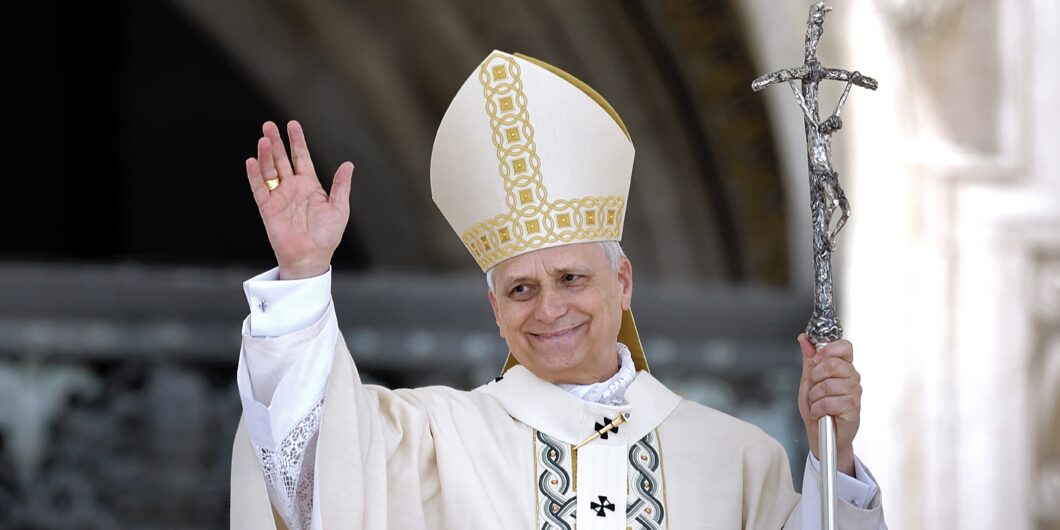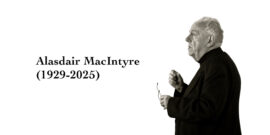Sleep experts are anxious to end Daylight Savings, because they want to put us to bed like toddlers.
A Touch of Aristocracy
Pope Leo XIV has only just acquired his new wardrobe, but already the Romans seem to love him. Everywhere he goes, he is thronged by joyful crowds. In America, too, Catholics are celebrating. We still can’t quite believe that we have an American pope.
It’s the honeymoon period, of course. Eventually there will be hard decisions to make, about China, recalcitrant German bishops, and issues not yet on the horizon. The new pope appears to be a mensch, with a talent for making more friends than enemies, but there will surely be severer tests to come. In a way, though, that makes the present moment especially revealing. A month ago, very few had heard of Cardinal Robert Francis Prevost. Now people love him, simply because he is the pope.
In the present case, this may be particularly true, for an interesting reason: far more than his predecessor, Pope Leo seems willing to be a pope. With Pope Francis, it always felt rather ambiguous. In the obvious sense, he was, of course, the pope, but he often seemed uncomfortable with the role. His iconoclastic stunts excited some people, and were frequently cast as an embrace of Franciscan simplicity, but the papacy isn’t really a dress-down kind of gig. Over the long term, it was demoralizing. Pope Leo has been stepping back into a more traditional papal persona, and Catholics are loving it.
For the pope, symbolism matters. People want to know that they can trust him to lead the Church, and the symbols underscore that. So where Pope Francis refused to live in the Apostolic Palace, the pope’s traditional residence, Pope Leo is moving back. Pope Francis famously bristled when people tried to kiss his ring, citing “hygiene” or time constraints as excuses to avoid an old custom he obviously found distasteful. Pope Leo seems unbothered, not haughty but gracious and pastoral. Already he seems more comfortable in papal garb than either Pope Francis or the introverted and professorial Pope Benedict. He may be an American, but he plays the patrician well. The Italians are clearly buying it, anyway.
The New World can have its patricians, too. Robert Prevost may be the first American pope, but he’s not the first man from this nation to appreciate the value of nobility. George Washington certainly knew how to be the statesman his people required. Abraham Lincoln cut an impressive figure. Perhaps, in honor of our first pope, Americans could reflect anew on this subject. We’re not constitutionally, or even Constitutionally, incapable of decorum, but our public square sometimes gives the impression that this is the Land of the Squalid and Home of the Vulgar. Is it possible to change this? Sometimes a touch of aristocracy is just what the world wants.
Papal Popularity
Enthusiasm for the pope is not a uniquely Old World phenomenon. Surveys suggest that Americans like him too, considerably more in fact than they like Catholicism. Only 34 percent have favorable views of Catholics generally, but the last three pontiffs have all enjoyed approval ratings among Americans that would make any president salivate. This was especially true of St. John Paul II, a true rock star with more than 90 percent net approval. But even the low-water mark is a solid 67 percent, which, tellingly, was Pope Benedict XVI’s approval rating in America immediately after his election, when the press was busily telling the public what a rock-ribbed hardliner he was. As the months of Benedict’s pontificate ticked by and the armies of ruler-wielding nuns failed to emerge, Americans softened on the German pope, and in the end, his numbers looked fairly similar to Pope Francis’. It seems Americans’ “generic pope” approval lingers between 70 and 90 percent.
Perhaps this is not, in the end, too mysterious. Popes can be popular today for the same reason that the First Lady generally enjoys much greater approbation than her president husband. Why wouldn’t she? With no real political power, First Ladies and popes largely get to be anodyne figureheads, congratulating Olympic athletes or comforting the afflicted after tragedies. Popes spend a lot of time blessing babies and talking about God’s love, which doesn’t grind many people’s gears.
Populism tends to be like a plate of pancakes: the first few bites are delicious, and the sugar rush is fun, but all too soon it turns into a stomachache.
We’re talking about the pope, though. He was long despised, by Protestants especially, accused of being the Antichrist or at least the symbol of corruption, decadence, and mindless authoritarianism. Even half a century ago, many Americans still worried that Catholics (such as John F. Kennedy) were unfit to be president, given their ostensibly unshakeable loyalty to the Chair of Peter. But look! Today we like the pope! We liked him even before an American assumed the office.
And there is something extraordinary in this. The pope, more than any other living person, symbolizes religious authority, tradition, and orthodoxy. Popes are draped in symbols of authority: the crossed keys, the Fisherman’s Ring, the papal mitre. Do these seem like Americans’ sort of thing? But while “anti-papist” sentiment does still exist in this country, it seems increasingly to be an antiquated curiosity. Yes, I’ve known people who still see Catholicism as fundamentally unAmerican, viewing ring-kissing as slavish and creedal recitations as an insult to the sensibilities of free men. But these people are now an eclectic minority. Popes, to most people, are now fascinating figures, like the remaining European monarchs: living bridges to a pre-modern past that we don’t truly want to forget. That’s why a conclave remains global news (and not just in the Catholic world) as people thrill to the rich images: red robes, a blue wall, white smoke billowing. Popes are even better than European monarchs! In addition to being a head of state, the pope does have some real authority (of a spiritual and institutional kind), even if his army is unintimidating.
The Excellence of Aristoi
The United States has no fond memories of kings, but even though our Declaration affirms that “all men are created equal,” Americans historically have not embraced equality in the same manner as the French Revolutionaries. Our Founders were mostly landed gentlemen whose political ideals left considerable room for paternalism. And even traditional aristocracy has had robust defenders, such as John Randolph of Roanoke, who famously declared that he “loved liberty but hated equality,” which for him did absolutely mean that the landed gentry of his native Virginia should be defended against the ravages of democracy. Randolph might look to modern Americans like a radical, but in his way, he was very much a lover of liberty. He had reasons for seeing liberty and aristocracy as a natural pairing, as many others have done historically.
There are reasons to hate aristocrats, who can exemplify all the bad aspects of entitlement: laziness, snootiness, a sense that the world owes them everything. We’re never going to embrace a real caste system in America, nor should anyone want that. But there are some ways in which aristocrats can genuinely excel and serve society. For instance, they can make an excellent counterweight to tyrannical abuses of power. King John did not sign the Magna Carta because he was pressured by an angry mob, or by university students marinating in political theory. It was the barons, England’s powerful aristocrats, who laid the foundations for constitutional government. Aristocrats have some power of their own, but not absolute, which gives them both the means and the motive to prevent power from consolidating too completely in one place.
They also tend to be natural conservatives. Their resources and leisure often enable aristocratic families to produce talented, accomplished, and high-minded men, but where university-based intellectuals tend to feel a strong pull from the left, aristocrats have a strong desire to protect the existing social order. They naturally understand themselves within the sweep of history, not in opposition to it. And this, in turn, disposes them to “protect the guardrails” of custom and culture in ways that meritocratic elites frequently do not. Reputation is worth a great deal to them, but they are generally close enough to lower-born people that they can be seen. They can be hypocrites, obviously, but at least aristocrats tend to want to preserve decorum and decency, which is more than one can say about most of America’s present elites.
Americans have always tended to prefer meritocracy or “natural aristocracy” to the more strictly hereditary forms. As Alexis de Tocqueville warned, the spirit of equality has given rise to a great deal of envy and social unrest, and sometimes the anti-elitist spirit is most at home in the gutter. But the opposite impulse still exists in American life. It can manifest in the most surprising ways, such as enthusiasm for the pope.
A New Nobility?
One cannot help but reflect that this shift may be especially welcome to Americans, given how base and vulgar our own political climate has become. Whether in the papacy or democratic politics, populism tends to be like a plate of pancakes: the first few bites are delicious, and the sugar rush is fun, but all too soon it turns into a stomachache. Truthfully, it must be awkward to be the pope in an age when even “black tie functions” generally really are not. I can feel some compassion for Pope Francis. But how much more impressive, then, that a poor kid from Chicago seems able to do it.
It’s especially refreshing given the vulgar spirit of our times. Examples are legion but I will limit myself to one: a few months back, in the midst of DOGE’s whiplash-inducing round of Federal firings, I happened to see on X one day a meme posted by Elon Musk in which he had photoshopped his face onto an image of a boxer parading around the ring, flexing and celebrating his manly physique. This behavior isn’t in any way unique to him, obviously, and I care about bureaucratic bloat. But still, at that moment I could not help but feel a visceral disgust. Musk is the richest man in the world, with immense gifts. He could be magnanimous, inspiring, a great man. Instead, he thrills to the kinds of memes one expects from middle schoolers, as he drives a truck through the lives of thousands of Americans. Why must our most powerful and influential men be so unspeakably petty and small?
We’re still getting to know Pope Leo XIV, but whatever else he might turn out to be, he does not seem petty, nor small. Especially moving to me is his willingness to sing at liturgically appropriate moments, in front of the world, as no recent pope has been willing to do. It’s very Augustinian, an expression of the dictum that “he who sings, prays twice.” His voice is good, but not of professional quality; Simon Cowell would eviscerate him on American Idol. But who cares? The world has plenty of performers already.
What we need is not entertainment, but morally serious men willing to exercise authority for others. Perhaps America can still produce such men. Let’s hope Robert Prevost wasn’t the only one.



